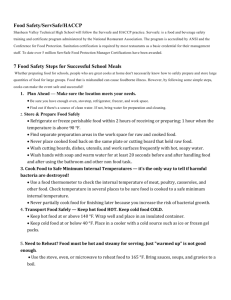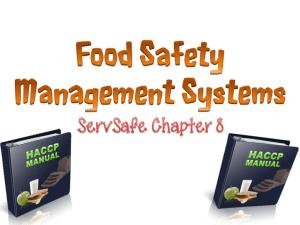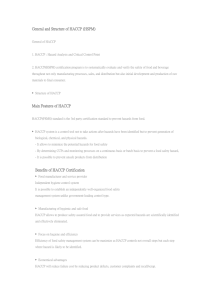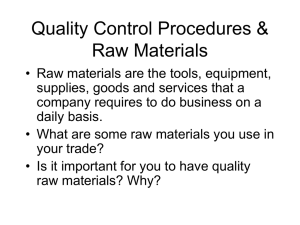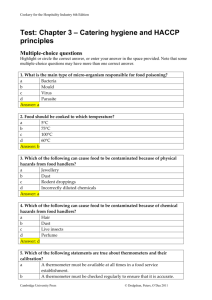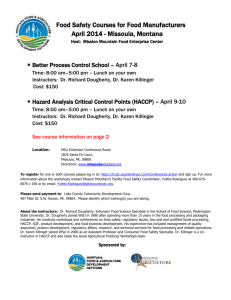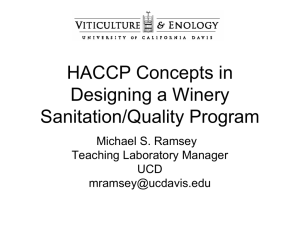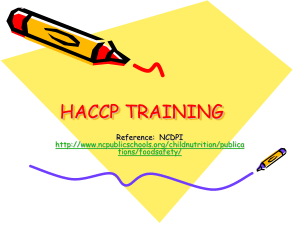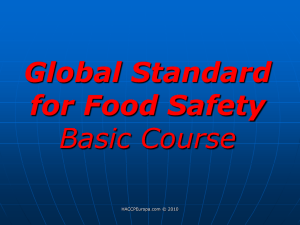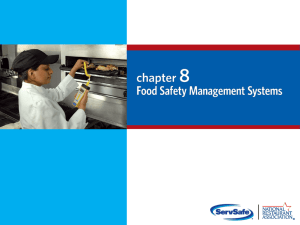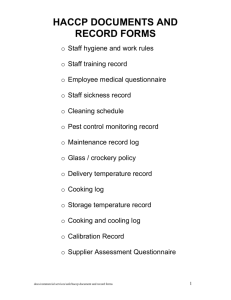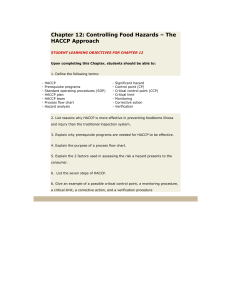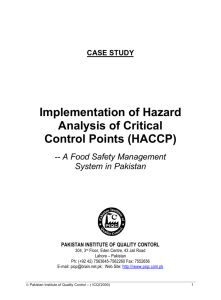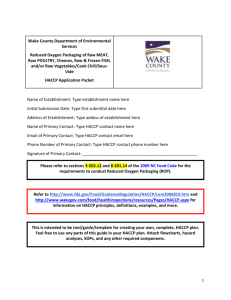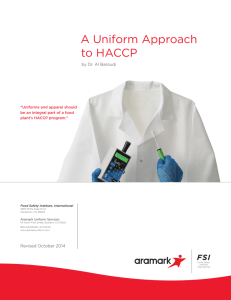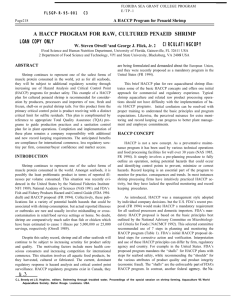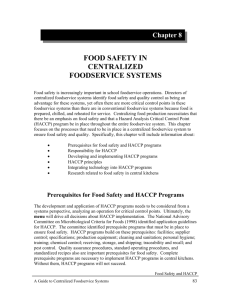hazard-analysis worksheet - Seafood Network Information Center
advertisement
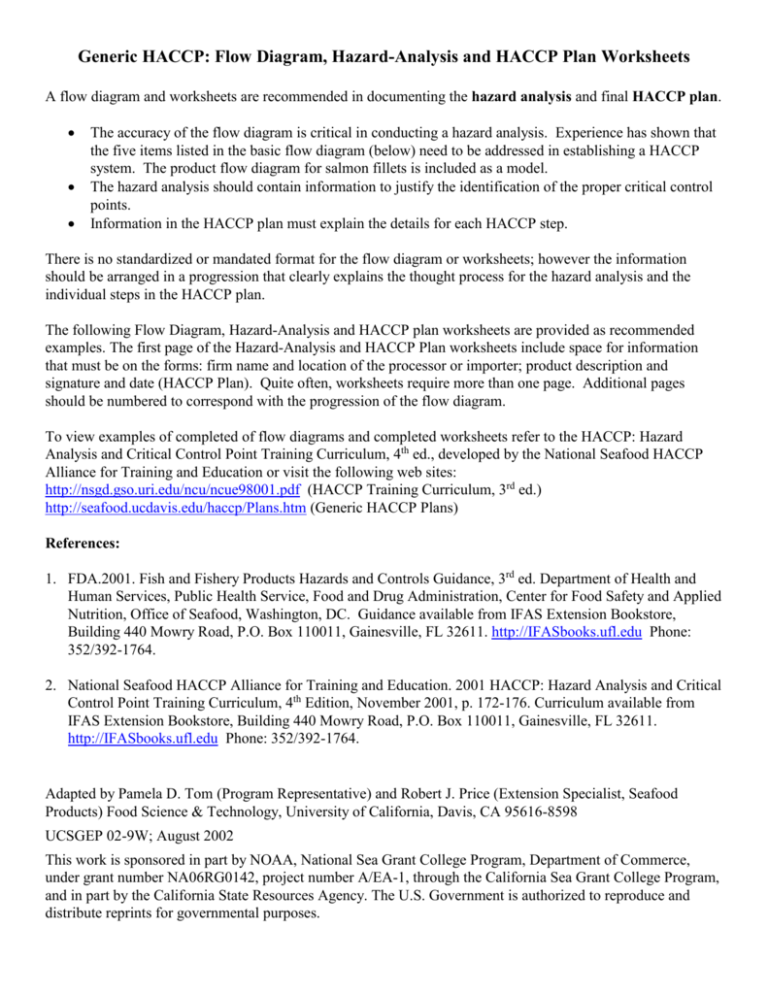
Generic HACCP: Flow Diagram, Hazard-Analysis and HACCP Plan Worksheets A flow diagram and worksheets are recommended in documenting the hazard analysis and final HACCP plan. The accuracy of the flow diagram is critical in conducting a hazard analysis. Experience has shown that the five items listed in the basic flow diagram (below) need to be addressed in establishing a HACCP system. The product flow diagram for salmon fillets is included as a model. The hazard analysis should contain information to justify the identification of the proper critical control points. Information in the HACCP plan must explain the details for each HACCP step. There is no standardized or mandated format for the flow diagram or worksheets; however the information should be arranged in a progression that clearly explains the thought process for the hazard analysis and the individual steps in the HACCP plan. The following Flow Diagram, Hazard-Analysis and HACCP plan worksheets are provided as recommended examples. The first page of the Hazard-Analysis and HACCP Plan worksheets include space for information that must be on the forms: firm name and location of the processor or importer; product description and signature and date (HACCP Plan). Quite often, worksheets require more than one page. Additional pages should be numbered to correspond with the progression of the flow diagram. To view examples of completed of flow diagrams and completed worksheets refer to the HACCP: Hazard Analysis and Critical Control Point Training Curriculum, 4th ed., developed by the National Seafood HACCP Alliance for Training and Education or visit the following web sites: http://nsgd.gso.uri.edu/ncu/ncue98001.pdf (HACCP Training Curriculum, 3rd ed.) http://seafood.ucdavis.edu/haccp/Plans.htm (Generic HACCP Plans) References: 1. FDA.2001. Fish and Fishery Products Hazards and Controls Guidance, 3rd ed. Department of Health and Human Services, Public Health Service, Food and Drug Administration, Center for Food Safety and Applied Nutrition, Office of Seafood, Washington, DC. Guidance available from IFAS Extension Bookstore, Building 440 Mowry Road, P.O. Box 110011, Gainesville, FL 32611. http://IFASbooks.ufl.edu Phone: 352/392-1764. 2. National Seafood HACCP Alliance for Training and Education. 2001 HACCP: Hazard Analysis and Critical Control Point Training Curriculum, 4th Edition, November 2001, p. 172-176. Curriculum available from IFAS Extension Bookstore, Building 440 Mowry Road, P.O. Box 110011, Gainesville, FL 32611. http://IFASbooks.ufl.edu Phone: 352/392-1764. Adapted by Pamela D. Tom (Program Representative) and Robert J. Price (Extension Specialist, Seafood Products) Food Science & Technology, University of California, Davis, CA 95616-8598 UCSGEP 02-9W; August 2002 This work is sponsored in part by NOAA, National Sea Grant College Program, Department of Commerce, under grant number NA06RG0142, project number A/EA-1, through the California Sea Grant College Program, and in part by the California State Resources Agency. The U.S. Government is authorized to reproduce and distribute reprints for governmental purposes. Basic Flow Diagram Incoming Materials Processing Packaging Storage Distribution Sample Product Flow Diagram (Salmon Fillets) Receiving Freeze Fish Pump Glaze Sort Weigh/Package Refrigerated Storage Frozen Storage Head Ship Gut Wash Fillet Inspect HAZARD-ANALYSIS WORKSHEET Firm Name: Product Description: Firm Address: Method of Storage and Distribution: Intended Use and Consumer: (1) Ingredient/processing step (2) Identify potential hazards introduced, controlled or enhanced at this step (1) (3) Are any potential food-safety hazards significant? (Yes/No) (4) (5) (6) Justify your decisions for column 3. What preventative measures can be applied to prevent the significant hazards? Is this step a critical control point? (Yes/No) Biological Chemical Physical Biological Chemical Physical Biological Chemical Physical Biological Chemical Physical Page 1 of ____ HAZARD-ANALYSIS WORKSHEET (continued) (1) (2) (3) (4) (5) (6) Ingredient/processing step Identify potential hazards introduced, controlled or enhanced at this step (1) Are any potential food-safety hazards significant? (Yes/No) Justify your decisions for column 3. What preventative measures can be applied to prevent the significant hazards? Is this step a critical control point? (Yes/No) Biological Chemical Physical Biological Chemical Physical Biological Chemical Physical Biological Chemical Physical Biological Chemical Physical Biological Chemical Physical Page ____ of ____ HACCP Plan Form Firm Name: Product Description: Firm Address: Method of Storage and Distribution: Intended Use and Consumer: (1) Critical Control Point (2) Significant Hazards (3) Critical Limits for each Preventive Measure (4) What Signature of Company Official: (8) Corrective Actions Monitoring (5) How (6) Frequency (7) Who Date: Page 1 of ____ (9) Verification (10) Records HACCP Plan Form (continued) (1) Critical Control Point (2) Significant Hazards (3) Critical Limits for each Preventive Measure (8) Corrective Actions Monitoring (4) What (5) How (6) Frequency (7) Who Page ____ of ____ (9) Verification (10) Records
